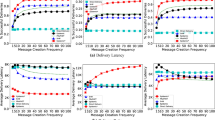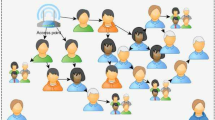Abstract
To improve the performance of information retrieval in Delay Tolerant Networks (DTN), multiple replicas of information are often deployed. In this paper, we mainly study dynamic information, which evolves with time. For simplicity, we use the information IM as an example. We use the discrete time model, and the time is divided into many slots. In each slot, a new version of the information is created. We say that one node’s age is k if it receives a replica of the information IM k−1 slots ago. Due to the constraint of the buffer or other factors, we cannot deploy too many replicas for a specific message. The goal of this paper is to study efficient ways for distributing the limited replicas to maximize the availability of the information. In particular, we consider two policies, which are source-control policy and destination-control policy, respectively. In the first one, if the source node encounters with one node whose age is k, it will forward a new version of the information to this node with probability p(k). In the second policy, if one node’s age is k, it discards the replica with probability p(k). We prove that the optimal value of p(k) in both cases conforms to the threshold form. Simulations based on both synthetic and real motion traces show the accuracy of our model. Numerical results show that the destination-control policy is better.








Similar content being viewed by others
Abbreviations
- S :
-
The source node
- N :
-
The number of relay nodes
- P i,j :
-
The transition probability from age (state) i to j
- λ :
-
The parameter of the inter-meeting time
- q :
-
The probability of two nodes meet in one time slot
- Δ :
-
The duration of one time slot
- π i :
-
The stationary probability that a node is in state i
- K :
-
The maximal age of the information
- p(k):
-
The forwarding or discarding probability in age k
- U(k):
-
The utility function
- σ :
-
The maximal number of replicas
- p :
-
The vector of the forwarding or discarding probability
- M(p),T(p):
-
The objective function and the average number of replicas
References
Fall K (2003) A delay-tolerant network architecture for challenged internets. In: Proceedings of ACM SIGCOMM, pp 27–34
Papastergios G, Psaras I, Tsaoussidis V (2009) Deep-space transport protocol: a novel transport scheme for space DTNs. Comput Commun 32(16):1757–1767
Soares V, Farahmand F, Rodrigues J (2011) Traffic differentiation support in vehicular delay-tolerant networks. Telecommun Syst 48(1–2):151–162
Costa P, Mascolo C, Musolesi M, Picco GP (2008) Socially-aware routing for publish-subscribe in delay-tolerant mobile ad hoc networks. IEEE J Sel Areas Commun 26(5):748–760
Bulut E, Wang Z, Szymanski B (2010) Cost effective multi-period spraying for routing in delay tolerant networks. IEEE/ACM Trans Netw 18(5):1530–1543
Xian Y, Huang C-T, Cobb J (2011) Look-ahead routing and message scheduling in delay-tolerant networks. Comput Commun 34(18):2184–2194
Gu B, Hong X, Wang P (2011) Analysis for bio-inspired thrown-box assisted message dissemination in delay tolerant networks. Telecommun Syst. doi:10.1007/s11235-011-9554-9
Li Q, Zhu S, Cao G (2010) Routing in socially selfish delay tolerant networks. In: Proceedings of INFOCOM, pp 1–9
Xu K, Hui P, Li V, Crowcroft J, Latora V, Lio P (2009) Impact of altruism o opportunistic communications. In: Proceedings of ICUFN, pp 153–158
Altman E, Nain P, Bermond JC (2009) Distributed storage management of evolving files in delay tolerant ad hoc networks. In: Proceedings of IEEE INFOCOM, pp 1431–1439
Podlipnig S, Boszormenyi L (2003) A survey of web cache replacement strategies. ACM Comput Surv 35(4):374–398
Yang K, Chiu G (2011) A hybrid pull-based with piggybacked push protocol for cache sharing. Comput J 54(12):2017–2032
Reich J, Chaintreau A (2009) The age of impatience: optimal replication schemas for opportunistic networks. In: Proceedings of ACM international conf on emerging networking experiments and technologies, pp 85–96
Ionannidis S, Massoulie L, Chaintreau A (2010) Distributed caching over heterogeneous mobile networks. In: Proceedings of ACM international conf on measurement and modelling of computer systems, pp 311–322
Huang Y, Gao Y, Nahrstedt K, He W (2009) Optimizing file retrieval in delay-tolerant content distribution community. In: Proceedings of the 29th conf on distributed computing systems, pp 308–316
Gao W, Cao G (2011) Supporting cooperative caching in disruption tolerant networks. In: Proceedings of the 31th conf on distributed computing systems, pp 151–161
Zhu X, Li Q, Cao G et al (2011) Social-based cooperative caching in DTNs: a contact duration aware approach. In: Proceedings of IEEE conf on mobile ad-hoc and sensor systems, pp 92–101
Zhu X, Li Q, Gao W, Dai Y (2011) Contact duration aware data replication in delay tolerant networks. In: Proceedings of IEEE conf on network protocols (ICNP), pp 236–245
Hyytiä E, Virtamo J, Lassila P et al (2011) When does content float? Characterizing availability of anchored information in opportunistic content sharing. In: Proceedings of the 30th IEEE conf on computer communications, pp 3137–3145
Ott J, Hyytiä E, Lassila P et al (2011) Floating content: information sharing in urban areas. In: Proceedings of IEEE international conf on pervasive computing and communications, pp 136–146
Chaintreauk A, Boudec JYL, Ristanovic N (2009) The age of gossip: spatial mean field regime. In: Proceedings of ACM international conf on measurement and modelling of computer systems, pp 109–120
Altman E, El-Azouzi R, Menasché DS et al. Forever young: aging control in DTNs. Online referencing. http://arxiv.org/PS_cache/arxiv/pdf/1009/1009.4733v1.pdf
Krifa A, Barakat C, Spyropoulos T (2008) Optimal buffer management policies for delay tolerant networks. In: Proceedings of annual IEEE communications society conf on sensor, mesh and ad hoc communications and networks, pp 260–268
Krifa A, Barakat C, Spyropoulos T (2010) Message drop and scheduling in DTNs: theory and practice. Technical report, HAL INRIA, Referencing. http://hal.archives-ouvertes.fr/docs/00/54/23/09/PDF/TMC-DTN.pdf
Karagiannis T, Le Boudec J, Vojnovi M (2007) Power law and exponential decay of intercontact times between mobile devices. In: Proceedings of annual international conf on mobile computing and networking, pp 183–194
Cai H, Eun D (2009) Crossing over the bounded domain: from exponential to power-law intermeeting time in mobile ad hoc networks. IEEE/ACM Trans Netw 17:1578–1591
Gao W, Li Q, Zhao B et al (2009) Multicasting in delay tolerant networks: a social network perspective. In: Proceedings of ACM MobiHoc, pp 299–308
Lee K, Yi Y, Jeong J et al (2010) Max-contribution: on optimal resource allocation in delay tolerant networks. In: Proceedings of IEEE INFOCOM, pp 1–9
Zhu H, Fu L, Xue G et al (2010) Recognizing exponential inter-contact time in VANETs. In: Proceedings of IEEE INFOCOM, pp 1–5
Shaked M, Shantikumar JG (1994) Stochastic orders and their applications. Academic Press, New York
Keranen A, Ott J, Karkkainen T (2009) The ONE simulator for DTN protocol evaluation. In: Proceedings of SIMUTOOLS
SJU Traffic information grid team, Grid Computing Centre, Shanghai Taxi Trace Data, Online Referencing. http://wirelesslab.sjtu.edu.cn/
Author information
Authors and Affiliations
Corresponding author
Rights and permissions
About this article
Cite this article
Wu, Y., Deng, S. & Huang, H. Optimal management of dynamic information in Delay Tolerant Networks. J Supercomput 66, 320–338 (2013). https://doi.org/10.1007/s11227-013-0909-8
Published:
Issue Date:
DOI: https://doi.org/10.1007/s11227-013-0909-8




